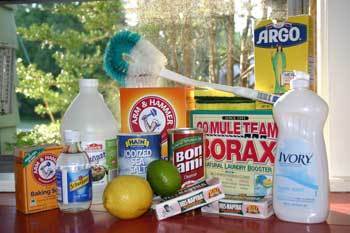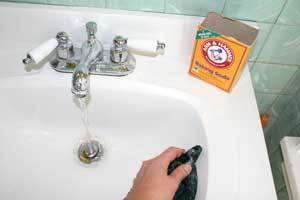If you're like me, one trip down the cleaning products aisle at your local grocery store can leave your eyes burning, your head pounding and leave you gasping for fresh air. Making your own green cleaning supplies is not only better for your indoor and outdoor environment and your health; it can save you a bundle of money. On average, $20 dollars of commercial cleaners will cost you less than $5 to make.

Mix and use in a spray bottle.
Tile and Linoleum: Mop with 1-2 teaspoons of dishwashing soap dissolved in 3 gallons of warm water. Rinse with a mixture of 1 cup white vinegar and 3 gallons water.
Sinks and Counters: Baking soda or Bon Ami makes a great scouring powder to clean or "bleach" refrigerators and shelves, coffee pots, cookware, wooden cutting boards, stainless steel, and plastic dishes.
Oven: Sprinkle the inside with warm water and baking soda. Let stand overnight and scrub with a moist pad. Also try salt or white vinegar.
Dishes: Pour 1 Tbsp of borax in the rinse dispenser for an alternative to dishwasher detergent. Use Seventh Generation, Palmolive, or Ivory dish soaps for hand washing dishes. Sprinkle burned pots and pans with a generous portion of baking soda and a small amount of water and let stand for several hours before scrubbing.

Shower Curtains: Wash them in the washer with a towel. Add in 1 cup of vinegar to the rinse cycle and hang or briefly tumble dry.
Soap Scum on Chrome Fixtures: Pour on undiluted vinegar and let stand for 5 minutes. Rinse with water and repeat as needed.
Lime Deposits: Soak showerheads and faucet parts in vinegar overnight.
Glass Cleaner: 1/4 cup vinegar in 1/2 gallon of water. Use a spray bottle to apply and wipe with newspaper. A great alternative to this mixture is plain club soda.
Clogged Drains: Use a generous amount of baking soda followed by a cup of white vinegar. Expect to see white foam. Flush with hot water and repeat as necessary.
Rust Remover: Sprinkle a little salt on the rust and squeeze a lime over the salt until it's thoroughly soaked. Let it stand for 2-3 hours and use the leftover rind to scrub it off.
General Stains: Soak in borax and water.
Cola, Wine & Ketchup Stains: If clothing is 100% cotton or a cotton-poly blend, sponge with diluted vinegar within 24 hours. Wash normally.
Deodorant and Antiperspirant stains: Rub with white vinegar before washing.
Bleaching: Use non-chlorine bleach.
Fabric Softener: Add 1/2 cup of vinegar and 1/2 cup of water in rinse dispenser.
For light loads use 1 cup, for full or heavily soiled loads use 2 cups. Tips: If you can't find Fels Naptha soap (made by DIAL soap) in your area, Ivory bar soap flakes or Octagon Soap are good alternatives. Washing soda is not the same as baking soda - DON'T substitute. Look for Arm & Hammer Super Washing Soda in the supermarket detergent isle.
Woodwork: Use all purpose cleaner.
Wood Floors: Use 1/2 cup of vinegar per gallon of water. Wipe dry.
Walls: Baking soda will remove scuffmarks.
Carpet & Rub Stains: Blot spill immediately. Sprinkle with baking soda, cornstarch, or borax and let dry. Wash with club soda and vacuum.
Furniture Polish: Mix one part white vinegar and three parts olive oil. Add a small amount of natural lemon oil.
Upholstery: Sprinkle on cornstarch and vacuum to freshen up and remove minor dirt.
Copper & Brass: Saturate a sponge or towel with vinegar or lemon juice and salt. Lightly rub, rinse, and dry.
Recycled Scrubbing Pads: Try old balled up panty hose or a half a used lemon sprinkled with salt.
If your store doesn't stock them, let the manager know you want them to carry environmentally friendly products. Until they do, keep the following in mind:
Read labels carefully. By law, toxic chemicals need to carry one or more signal words: Danger, Poison, Warning, Caution. Look for products containing non-petroleum based surfactants, and those that claim to be non-toxic, biodegradable, and are free of chlorine and phosphates.
Don't buy products containing ammonia or chlorine (usually found in scouring powders, dishwater detergents, bathroom cleaners, and laundry bleach). These two chemicals cause health problems and damage the ozone.
Stay away from traditional toilet bowl cleaners, oven cleaners and furniture polish. These contain the highest amounts of toxic chemicals.
Buy non-chlorine bleached paper products. The process of bleaching paper releases dioxin, a known carcinogen, into the atmosphere. Buying paper products labeled "non-chlorine bleached" will help cut down on dioxin pollution.
This page contains the following solutions.
Non-Toxic Homemade Substitutions. There are many inexpensive, easy-to-use natural alternatives which can safely be used in place of commercial household products. Here is a list of nine ordinary, environmentally safe products which can be used alone or in combination for a wealth of household applications.
Here are the questions asked by community members. Read on to see the answers provided by the ThriftyFun community.
I have begun cleaning houses. I try to use non toxic items. I have a problem cleaning soap scum off of shower walls and the accompanying glass doors. I don't have a lot of time to spend, as I have a time limit in each home.
EarthStone. I found it at Walmart in the dish detergent area with the scrub pads. It is a Pumice Stone that can be used on glass, ceramic, porcelain. It works really great.It took off all the soap scrum from the ceramic tiles and porcelain tub. Just use with water. Vinegar also is a good cleaner too.
I use a wad of nylon net & amonia to shine up my tub. Nylon net is sold by the yard and very cheap.
Try half vinegar, half ivory pure dish soap. It works great. You can use a little more vinegar, and a little less soap if you want.
We have marble in the shower and a lot of the cleaners can not be used on marble. Be sure to read the labels. I use dawn and scrub brush, but it time consuming. I would like to find a faster way without ruining the marble. Good luck on your cleaning job.
I like baking soda. I just wet the tub, sprinkle on the soda, do the other cleaning in bath and then use a plastic scrubbie (that I have made from the plastic bags that onion, etc. comes in)give it a good wipe down, rinse and you're done.
I save those bunched up nylon scrubbies ( that you get at the dollar store ) when they become old. Use a little baking soda or borax and scrub with those. I've also used cheap shampoo ( also bought at the dollar tree) to clean soap scum from the bathtub and shower. It seems to melt bath tub ring away quickly. If you get the scented shampoo (mango or coconut), it leaves the bathroom smelling great. A little on an old scrubbie goes a long way.
What I have tried that works for me is hand sanitizer. It will clean I think almost anything. The bonus is that things just sparkle and shine after using it. I use it on mirrors and even on appliances.
I use baking soda for the slime from the water. But to clean, I use in a spray bottle 1/2 water, 1/2 vinegar and about 10 drops of lavender/tea tree oil. You can use just lavender oil and make sure it is essential oil and not fragrance oil.
I also clean houses and I have found that the Mr Clean sponges work wonders. You don't need chemicals and they make taking off the soap scum a quicker and easier job.
Strangely enough, using soap to remove its own marks seems to work. I simply put on a pair of those exfoliating gloves, lather up, and scrub over the areas. Rinse off. Hope it works for you as well as it does for me.
I just removed what looked like years of soap scum from a shower and it's doors yesterday. My customer was in tears as she thought she'd have to replace them. Here's what I used...Dryer Sheets!
Just wet the door, rub with the sheets and rinse or wipe off. Repeat if needed. Then I shine with Method spray cleaner or Vinegar and Water.